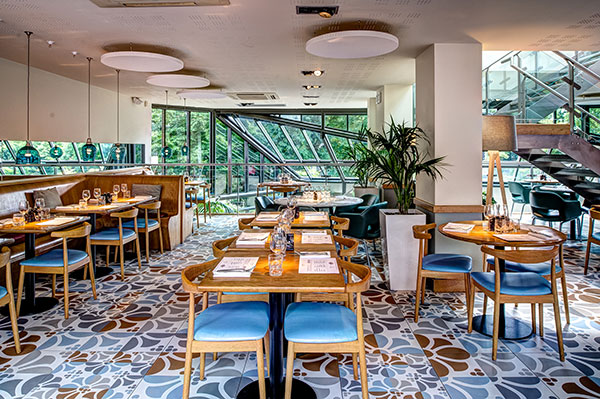Chefs, restaurateurs and suppliers in Bristol have joined forces in a new union to protect their livelihoods and help keep food moving after closures due to coronavirus left the sector reeling.
Boris Johnson closed nationwide restaurants, pubs and other public eateries from 20 March to enforce social distancing as the virus took hold across the UK, leaving supply chains overloaded with food and no customers, and chefs and restaurateurs facing loss of livelihoods almost overnight.
The mass closure of the eating out sector compounds the cancellation of events and festivals across the summer, impacting yet another outlet for small-scale food producers.
Bristol Food Union (BFU) was set up by a group of chefs and restaurateurs in response to the crisis, who were quickly joined by several independent restaurant groups in Bristol. They have since partnered with Caring in Bristol and Feeding Bristol, to support the city’s provision for homeless and vulnerable groups.
The group reached a crowdfunding target of £20,000 in one week and has begun supplying around 500 meals a day to frontline groups in the city, including social care and vulnerable adults, homeless citizens, and NHS and emergency workers.
Meals are ordered by frontline services, and a chef coordinator from BFU then distributes orders to secure production kitchens in closed restaurants. They cost £5 to produce with £1 going to BFU and £4 to the restaurant, where the majority can go to directly to the supply chain.
“So you might have one restaurant making 100 veggie bakes for that day, or another making 50 lasagnes,” said events and food media specialist, Aine Morris, who set up BFU alongside Michelin-starred chef Josh Eggleton of The Pony and Trap, and Steph Wetherell of Bristol Food Producers.
“It won’t sustain a business completely, but it does mean we have chefs in kitchens who are ordering produce from their supply chain,” she said.

Morris, who is a former director of the Abergavenny Food Festival, warned that it is the small producers who will be hit hardest.
“The big supermarkets have enough cash in the bank to ride this out. The small artisan cheese maker, or other small producers, absolutely do not,” she said.
“If you, as a small producer, were dependent on 20 per cent of your income coming from events and festivals, and the remaining 80 per cent from restaurants, your entire income will have been wiped out. It’s the artisan food producers, like the small cheese makers or charcuteries, for example who will be hit hardest.”
Many larger producers have begun selling direct to customers, while restaurants and pubs have moved into home delivery or takeaways in an effort to keep trading.
“We can’t expect the shopping public to go online and start shopping from 15 individual websites,” said Morris. “So we created one point of information and a way of supporting those businesses.”
She said the idea for a food union has been building in Bristol, as part of a movement to connect the public to their food supply chain, but it was fast-tracked as the huge impact of the coronavirus on hospitality businesses became apparent.
Morris said it’s “remarkable” how many have offered to join the union and offer voluntary work but stressed that it’s “not just charity”.
“We are fighting for our livelihoods and our incomes. I am a single parent with two children to support, one chef involved has three children and his house is mortgaged against his business, another has three restaurants and won’t be able to re-open two of them. This is not just charity, we’re literally fighting for our lives.”
Hospitality sector responds to ‘devastating’ closures
The news comes as the UK enters its third week of lockdown, and a reduction of food rationing and limitations at the major supermarkets. Reports of stockpiling, bare shelves and soaring demand for home delivery have dominated the headlines around coronavirus impact on food, while the supply chain for hospitality has remained largely unreported.
The Sustainable Restaurant Association (SRA) said the impact of coronavirus has been “devastating” for both suppliers and restaurants.
“Closing the doors on an industry that employs three million people and serves eight billion meals a year was a drastic, if essential step,” said Tom Tanner, a spokesperson for the SRA.
“What’s heartening, but really not that surprising in an industry as nimble and creative as ours, is the extraordinary way in which some operators have adapted their model.
“Restaurant kitchens have been transformed into production kitchens, cooking on a grand scale to provide nutritious and delicious meals for thousands of NHS workers and vulnerable people who can’t get to the shops,” said Tanner.

Wholesale markets have been flooded with cheap fruit and veg as large catering suppliers have no need of supply, sending prices plummeting. In London, wholesalers at New Covent Garden Market, which almost solely supplies premium restaurants in the capital have lost their biggest customer base, while traders at Billingsgate wholesale fish market have said they have been forced to close.
“The government are doing an awful lot to preserve the supply of food into supermarkets above all else,” said Morris, adding that wholesalers are being told to prioritise their supply to supermarkets above indie retailers and restaurants.
“And I understand that in a crisis situation. But it also assumes that the globalised and industrialised food supply chain is enough to feed us in the future,” she said.
“We should view this as the first wave in a long-term serious and significant climate disruption. This is only the start. We know a sustainable food movement exists in the UK that is dynamic and resilient: the crisis has only made the need for us all to collaborate more real.”













0 Comments